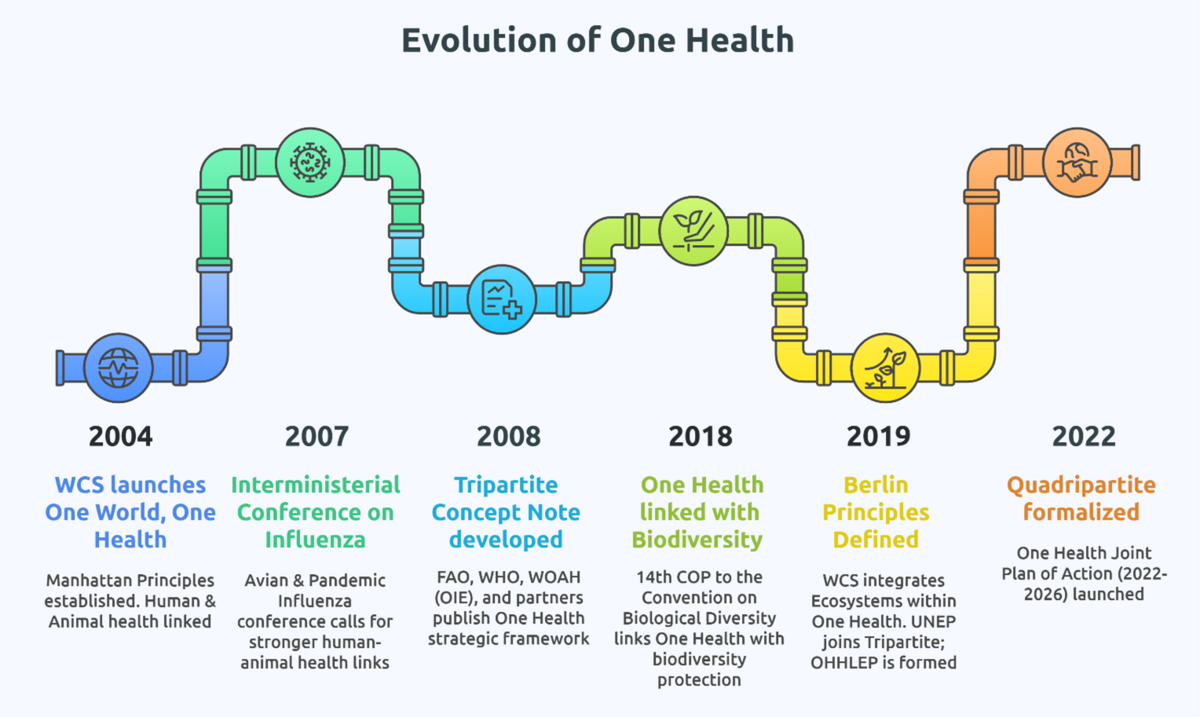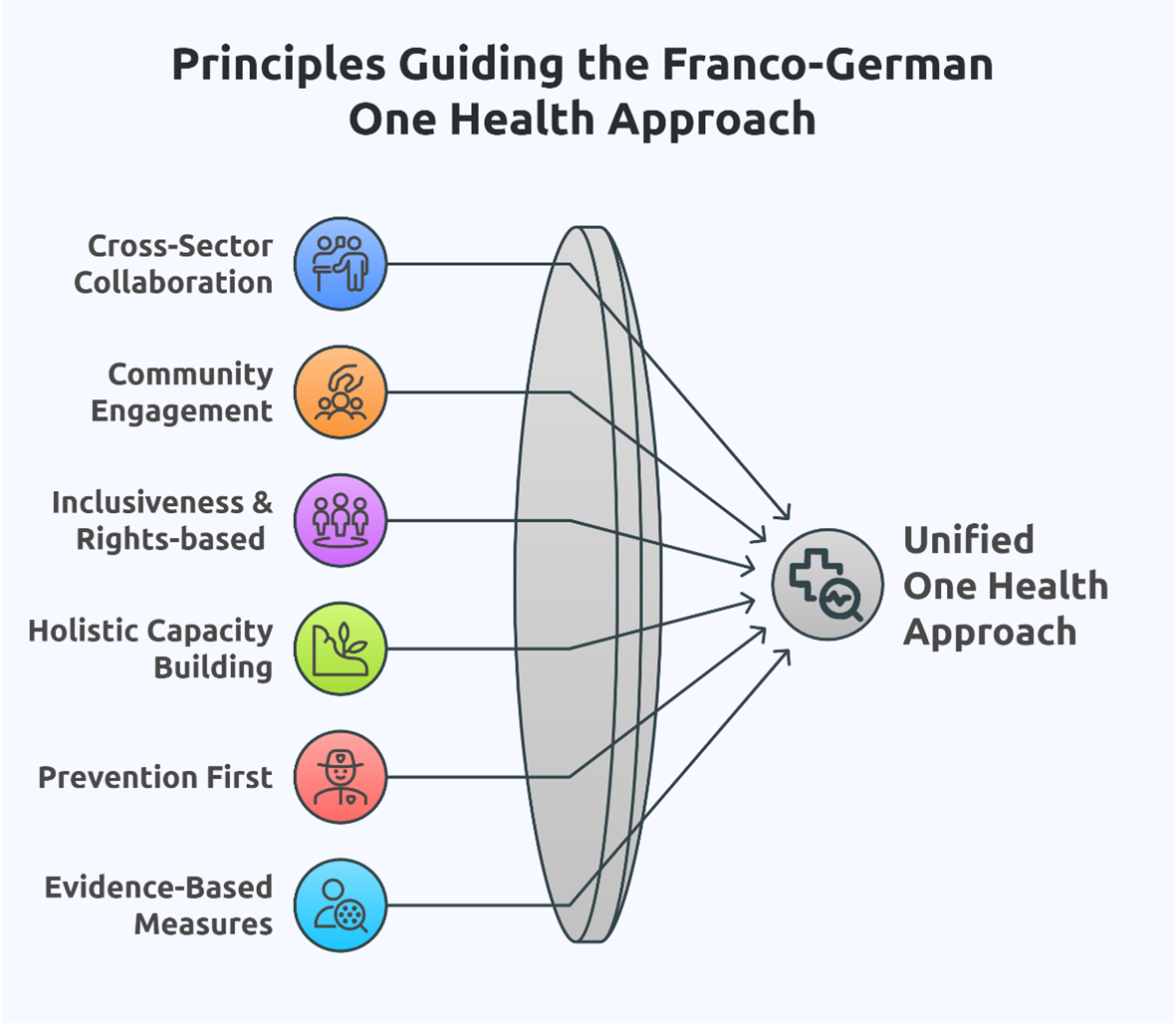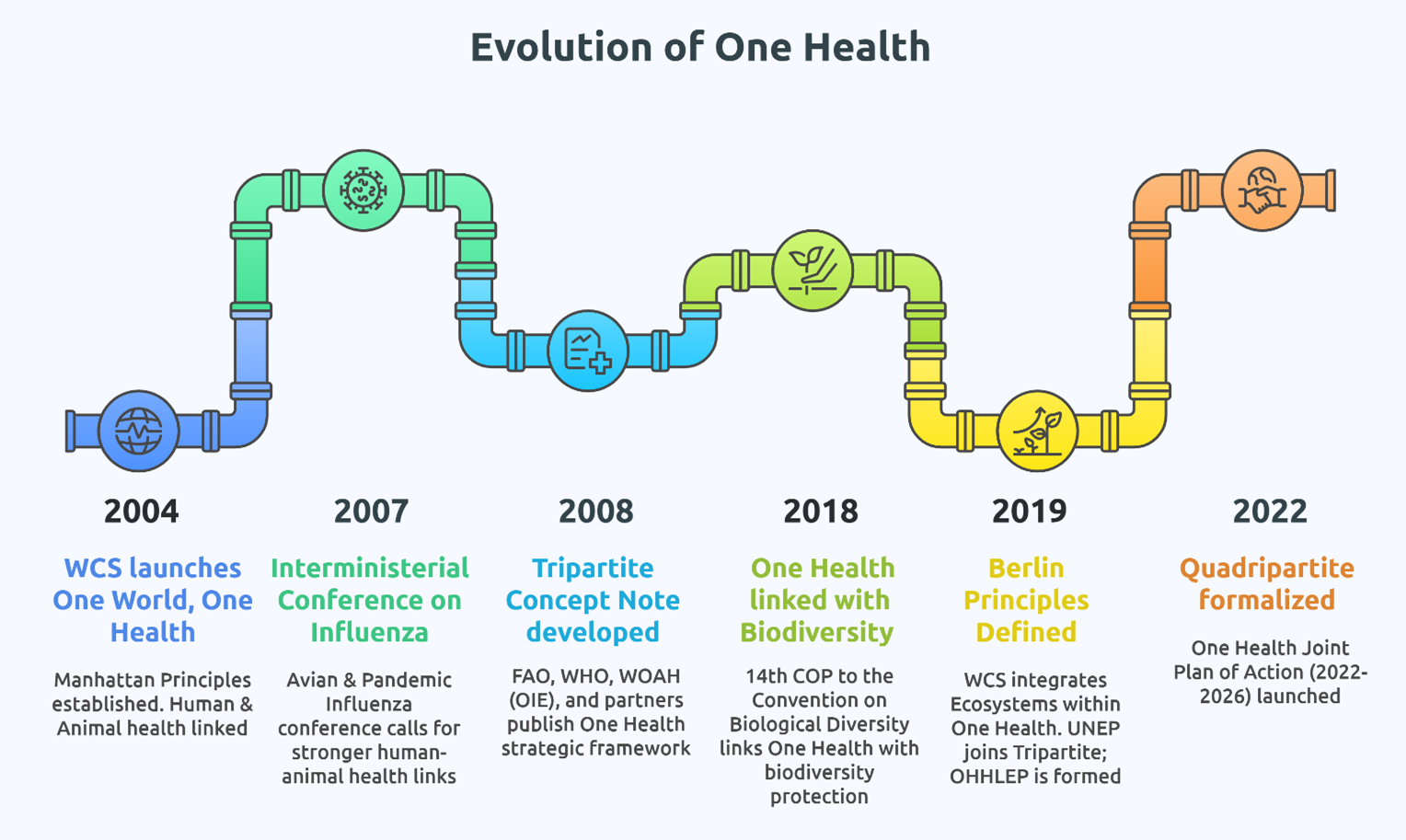France and Germany in Action: Putting One Health Approach into Practice
![[Translate to English:] [Translate to English:]](/fileadmin/user_upload/One_Health__Ger___Fra_in_Action.png)
One Health - how theory becomes action? France and Germany show how with global projects, strong partnerships, and local solutions.
The world faces growing health threats. Pandemics, antimicrobial resistance (AMR), and climate change put millions at risk. France and Germany are taking action. Their commitment to One Health shows how international cooperation can tackle these complex challenges by linking human, animal, and environmental health.
The Agence Française de Développement (AFD), Expertise France, Deutsche Gesellschaft für Internationale Zusammenarbeit (GIZ), and KfW Development Bank have released their first joint report. It shares lessons on how to put the One Health approach into practice with real world examples and shared principles.
This article is based on insights from Dr Susanne Grimm, Arnaud Laurent and Tobias Luppe, focal experts from GIZ, AFD Group and KfW.
Human health does not stand alone. It connects with animal health and the environment. Climate change, deforestation, and urbanization make these links impossible to ignore. The COVID-19 pandemic showed that diseases do not respect boundaries. A growing population and extreme weather add to the urgency.
The One Health approach offers a simple idea: health is interconnected. The approach focuses on root causes instead of just treating symptoms. It builds cooperation across sectors – health, environment, and agriculture. The One Health High-Level Expert Panel (OHHLEP) defines it as:
“An integrated, unifying approach that aims to sustainably balance and optimize the health of people, animals, and ecosystems.”

This approach moves away from isolated fixes and builds on decades of learning.
France and Germany support this vision and its integration into international development efforts. They helped form the Quadripartite Collaboration (FAO, UNEP, WHO, WOAH) and backed the creation of OHHLEP in 2021. Their agencies are now turning policy into action worldwide.
Germany has been a key advocate for One Health, embedding it in global health policies since its 2015 G7 presidency. The approach became central to AMR action plans and outbreak response strategies. The 2017 G20 Health Ministers’ meeting, the BMZ 2030 Reform Strategy, and Germany’s Global Health Strategy (2020) all reinforced this commitment.
Germany applies One Health in pandemic prevention, zoonotic disease control, and AMR mitigation. Through GIZ and KfW, Germany supports projects that link biodiversity, agriculture, water, and health – creating real change worldwide.
France has driven One Health forward since 2011. It focuses on global advocacy, capacity building, surveillance coordination, research, regional monitoring, and education. It has also applied the approach to AMR at the national level. The French Global Health Strategy (2023-2027) reinforces this commitment, emphasizing stronger links between human, animal, and environmental health.
Through AFD and the PREZODE initiative, France supports international cooperation on zoonotic disease prevention and holistic health risk management.
One Health is not just a concept, it is a set of real-world solutions. GIZ, AFD, KfW, and Expertise France focus on six priority areas. Their work follows overarching principles and aligns with the Quadripartite One Health Joint Plan of Action (2022-2026).

1. Transforming Systems & Empowering Communities
One Health starts locally. Preventing health risks requires systemic change and community involvement. In Guinea and Senegal, AFD supports farmers reduce health risks. The PREZODE initiative identifies risks and creates tailored solutions. GIZ projects in Selva Maya rainforest support sustainable land use and local health solutions. These efforts show that real change happens when people take ownership.
2. Enhancing Surveillance & Rapid Response
Early detection saves lives. Germany and France support digital surveillance systems that track health risks across sectors. KfW supports digital health monitoring in Vietnam and Cambodia, while GIZ strengthens early-warning systems for zoonotic diseases in West Africa. AFD & Expertise France improve laboratory networks in Guinea, the DRC, and supports regional epidemic surveillance networks across Asia. Faster detection means fewer outbreaks.
3. Building a Skilled Workforce
A well-trained interdisciplinary workforce is key to One Health success. AFD’s SEGA network has trained 250+ professionals in the Indian Ocean region. GIZ-supported pandemic preparedness curriculum in East Africa prepares the next generation of health workers, and Expertise France recruits experts to strengthen response teams. Through these efforts, cross-sectoral experts learn to collaborate effectively and act fast.
4. Creating Strong Policies
One Health needs robust policies and laws. Integrated policies that connect health, agriculture, and environmental sectors pave the way for sustainable change. AFD supports national strategies through the PREZODE initiative and “Health and Territories” programs in several countries. GIZ supports countries create cross-sector policies in Africa and Asia.
5. Fostering Cross-Border Cooperation
Health threats like climate change, disease outbreaks, and AMR know no borders. German Development Cooperation supports organizations in East and West Africa to foster cross-border collaboration, establish expert teams, and deploy mobile laboratories for timely disease detection and response. The goal? Stop outbreaks before they spread.
6. Promoting Research and Evidence
Scientific evidence is the backbone of effective One Health action. AFD supports ECOMORE research in Southeast Asia, studying links between environmental change and disease. Expertise France’s “Onheto” project in Togo researches AMR in human and animal health across inpatient, outpatient, and environmental settings. Better data enables targeted prevention strategies.
One Health is not just a vision – it is a roadmap to a healthier, more sustainable future. It supports SDG goals on poverty reduction, health, environmental protection, and economic growth. Through the Quadripartite Joint Plan of Action (2022-2026) and Team Europe Initiative, France and Germany commit to advance the One Health approach and global health security.
But real change needs global commitment. Governments, researchers, civil society, NGOs, private companies, and international organizations all have a role to play.
🚀 Be part of the movement.
